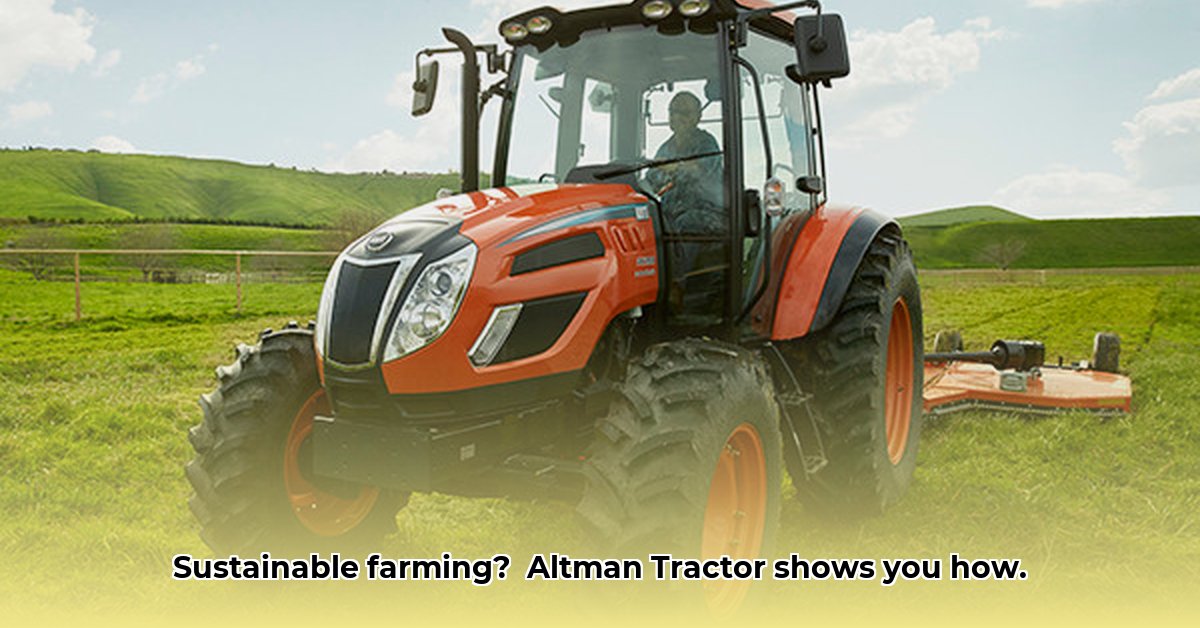
Altman Tractor isn't just another farm equipment dealership; it's a cornerstone of Florence, South Carolina's agricultural community, deeply intertwined with the region's efforts toward sustainable farming. For generations, local farmers have relied on Altman Tractor for the tools that power their livelihoods, but their support extends beyond equipment sales—it's a commitment to helping the community thrive sustainably. For more information on similar dealerships, check out this nearby dealership. This article explores Altman Tractor's vital role in the region's agricultural landscape and the broader push towards sustainable practices.
Altman Tractor's Role in Florence's Agricultural Landscape
Picture the heart of Florence's farming scene: hardworking farmers cultivating fields that stretch to the horizon, the steady hum of farm machinery a constant soundtrack. Altman Tractor is firmly embedded in this image, providing the tools that enable these farmers to cultivate their land. Their inventory spans from robust tractors that prepare the soil to specialized hay equipment crucial for livestock feed—a cornerstone of many local operations. This isn't just about selling machinery; it's about strengthening the local economy and supporting the people who sustain our food supply. However, to further understand Altman Tractor's contribution to sustainable agriculture, more details on their specific sustainability initiatives would be beneficial—do they prioritize fuel-efficient models, or offer precision agriculture technologies, for example? Such details would highlight their commitment to reducing environmental impact.
The Challenges and Opportunities of Sustainable Farming in Florence
Florence, like many agricultural areas, faces the constant challenge of balancing high productivity with environmental responsibility. Water conservation is paramount, particularly during drier periods. This is where technological innovation provides a solution. Precision agriculture tools—such as GPS-guided tractors and automated irrigation systems—offer powerful strategies for optimal resource utilization. These technologies not only cut down on water waste and fertilizer runoff but frequently increase yields as well, bolstering both financial performance and environmental sustainability. This presents significant opportunities for both Altman Tractor and the farmers they serve.
Another significant hurdle is the reliance on fossil fuels. Tractors are significant energy consumers, and fuel costs coupled with environmental concerns are major factors impacting profitability and sustainability. But the picture is brightening. The adoption of alternative fuels like biodiesel, and the potential integration of electric tractors, are gaining ground. Such advancements could revolutionize farming in Florence, reducing fossil fuel dependence, lowering operating costs, and significantly decreasing greenhouse gas emissions. While this is a longer-term goal, the potential positive impact is immense. Isn't it inspiring to see technological progress positively impacting the agricultural sector?
The Future: Shaping Sustainable Agriculture in Florence
The next five to ten years will likely be transformative for sustainable agriculture in Florence. Continued investment in research and development of more efficient and environmentally sound farming equipment is essential. Imagine tractors that consume far less fuel or utilize readily available biofuels—this isn't fantasy; it’s the future of farming. Altman Tractor, alongside other industry players, has a pivotal role in making this vision a reality. They can actively contribute by sourcing and providing cutting-edge, eco-friendly technology to their customers.
Transparency is key. A comprehensive sustainability report from Altman Tractor could significantly enhance community trust and showcase their leadership in promoting environmentally responsible practices. Such a document could highlight their efforts in sustainable materials sourcing, the provision of eco-friendly equipment, and their support for the local farmers' transition to more sustainable methods. This increased transparency could also attract new customers who value businesses with a strong commitment to environmental sustainability.
A Collaborative Path Forward: Actionable Steps
The path to promoting sustainable farming in Florence requires a cooperative effort involving local farmers, Altman Tractor, and the broader community. It's not a competition; it's a shared journey towards a brighter future.
Understanding Farmer Needs: Altman Tractor can conduct comprehensive surveys and focus groups to fully understand the specific needs and interests of local farmers regarding sustainable equipment and practices.
Investing in Innovation: Investing in research and development to integrate the latest eco-friendly technologies into their equipment offerings is crucial. This could involve collaborations with agricultural technology companies or universities exploring promising new technologies.
Advocacy for Incentives: Altman Tractor could become an active advocate for government incentives and subsidies encouraging the adoption of sustainable farming practices and the purchase of eco-friendly equipment. This would substantially reduce the financial obstacles to adopting new technologies for farmers.
Community Engagement: Organizing workshops, educational events, and demonstration days to educate farmers about sustainable agriculture practices and the benefits of new technologies is essential. This will also showcase Altman Tractor's dedication to sustainability.
By working together, Florence can become a model for sustainable agriculture, proving that economic success and environmental stewardship are not mutually exclusive. Altman Tractor, given its central role in the community, is ideally positioned to lead this crucial effort and help build a more environmentally-sound and economically thriving agricultural future for Florence.